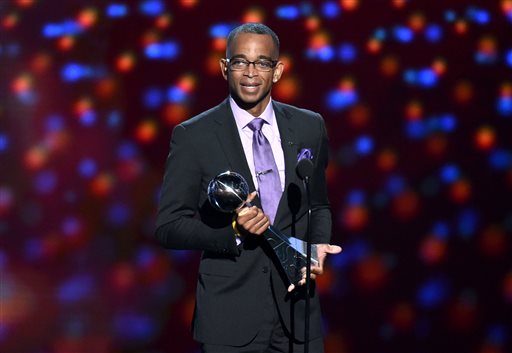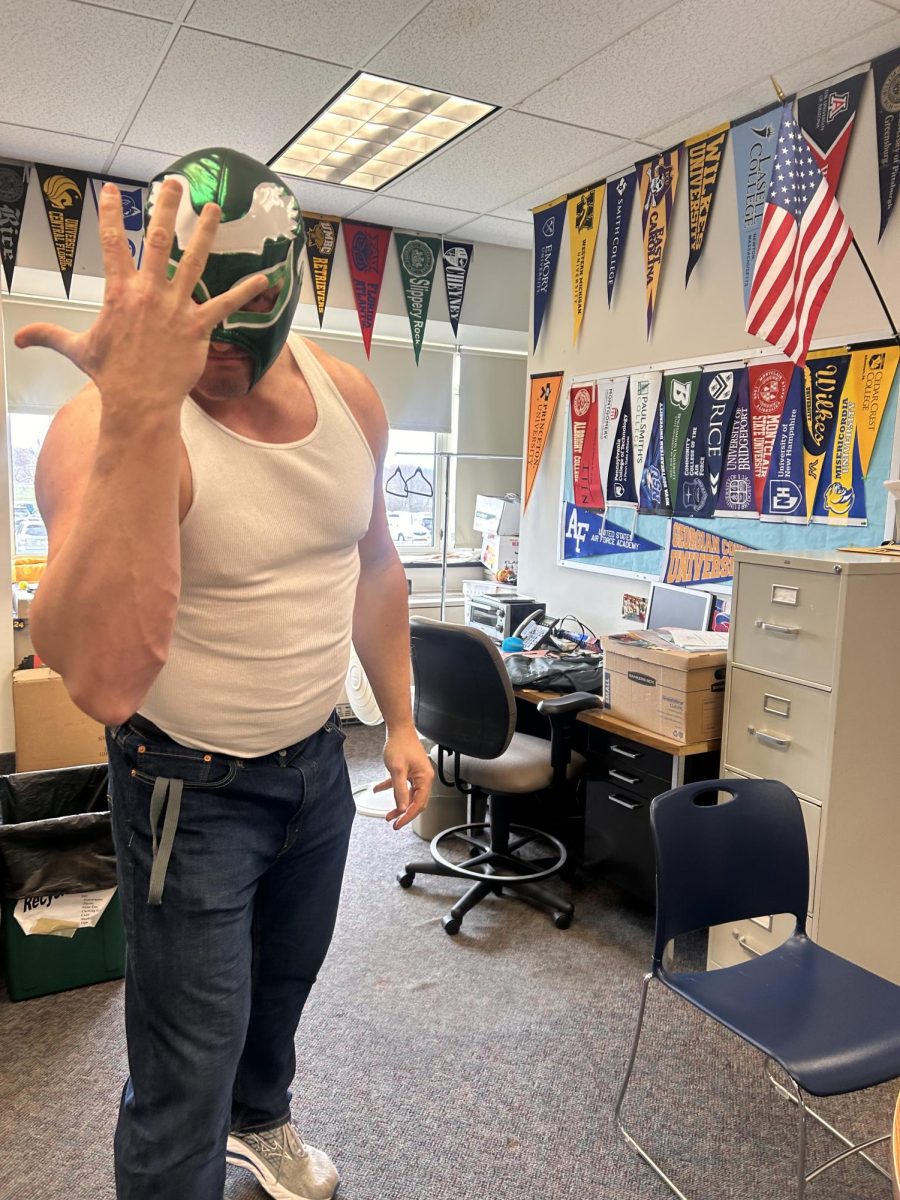Remembering sportscaster Stuart Scott; 1965-2014

In a July 16, 2014 file photo, sportscaster Stuart Scott accepts the Jimmy V award for perseverance, at the ESPY Awards at the Nokia Theatre, in Los Angeles. Scott, the longtime “SportsCenter” anchor and ESPN personality known for his known for his enthusiasm and ubiquity, died Sunday, Jan. 4, 2015 after a long fight with cancer. He was 49. (Photo by John Shearer/Invision/AP, File)
January 9, 2015
After a seven year battle with appendiceal cancer, longtime ESPN sportscaster Stuart Scott passed away Sunday, January 4 at age 49. A true icon to the world of sports media, Scott changed the course of modern sports television, while establishing a new lexicon in the world of sports coverage and analysis. His courage and determination, both in front of and behind the camera, impacted others throughout the course of his life.
After graduating in 1987 from the University of North Carolina with a degree in speech communication, Scott spent the early years of his career at local news stations in South Carolina and North Carolina. It was at these smaller stations that Scott honed his craft, developing the soulful and rhythmic tone of voice that he became so well known for. His career path took him to Orlando, Florida, where he worked for WESH, an affiliate of NBC.
Despite working at smaller stations, Scott displayed a tireless work ethic from the start of his career. Many of his signature catch phrases were developed while he worked at WESH, such as his phrase, “as cool as the other side of the pillow.” His confidence on air stemmed from relentless preparation off of it, and he became well known for his energy and enthusiasm for all kinds of news. ESPN producer Gus Ramsey knew that Scott was destined for great things, telling reporters for ESPN about the impression he made when he and Scott first met.
“You knew the second he walked in the door that it was a pit stop, and that he was gonna be this big star somewhere someday,” said Ramsey. “He went out and did a piece on the rodeo, and he nailed it just like he would nail the NBA Finals for ESPN.”
That prediction would come true when Scott was hired by ESPN in 1993 to work at the network’s new channel, ESPN2, by the Vice President for Talent, Al Jaffe, who was looking for a sportscaster to appeal to a younger audience. His first assignments began on SportsSmash, a short broadcast during ESPN2’s SportsNight, and when Keith OIbermann left the channel to move to SportsCenter, Scott became the anchor of SportsNight, and after this, began frequently appearing on SportsCenter. It was at ESPN that Scott became the one of the leading figures in sports broadcasting, injecting his hip-hop style into the network.
Scott talked in a way that was both enjoyable and exciting to hear, as well as easily received by his national audience. As a viewer, Scott’s vernacular and delivery made it feel as if he was talking directly to you, and he achieved success in communicating with a diverse audience that other sportscasters simply did not. While some resented Scott’s urban tone, his style appealed to the younger generations, specifically the younger African-American generation. Being an African-American, Scott identified with the hip-hop culture that was becoming the heart of sports in the late 1990s and early 2000s. Viewers across the nation came to not just enjoy, but crave his exciting analysis team moves and top plays on ESPN, hanging on his signature catchphrases, such as “And the Lord said you got to rise Up”, “You Ain’t Gotta Go Home, But You Gotta Get The Heck Outta Here,” and “Boo-yah!”
In the world of sports media, Scott became a true legend and established a long lasting legacy, but his battle with cancer left the world with much more than his emphatic reporting. Diagnosed with appendiceal cancer in 2007, a rare form of cancer that affects only 600-1,000 Americans per year, Scott continued broadcasting throughout chemotherapy treatments, leading ESPN and ABC’s NBA coverage on Christmas Day. The cancer eventually went into remission, but reappeared in 2011, went into remission shortly after, and returned again in 2013. Scott’s demeanor in the face of such a painful disease was, and is, inspirational. He endured chemotherapy pills and treatments, and then would spend hours doing mixed martial arts training to strengthen his body. Through it all, he never wanted to hear what stage he was in.
Scott brought the same determination, energy, and effort that he exhibited while reporting to his battle with cancer, and essentially to his entire life. He served as a figure of strength for other cancer patients, and his attitude became infectious to his colleagues at ESPN. His impact was hard-hitting and wide-spread, and his recognition was punctuated at the 2014 ESPYs. After winning the Jimmy V award for his fight against cancer, Scott left the world with a gem..
“When you die, that does not mean that you lose to cancer. You beat cancer by how you live, why you live, and the manner in which you live. So live. Live. Fight like hell.”
Stuart Scott met famous icons, interviewing sports icons such as Michael Jordan, Sammy Sosa, and Tiger Woods, as well as Presidents Bill Clinton and Barack Obama, but the people most important to him were his two daughters, Taelor and Sydni. To his final breath, Scott was a family man, an incredibly passionate broadcaster, and above all, an inspiration to all those he touched throughout his years as a reporter. He ushered in a new era of media through his personal determination and individualism, but also left behind a legacy of strength and professionalism, and will be remembered across generations for his groundbreaking efforts in all he did. And that, in and of itself, is as cool as the other side of the pillow.









